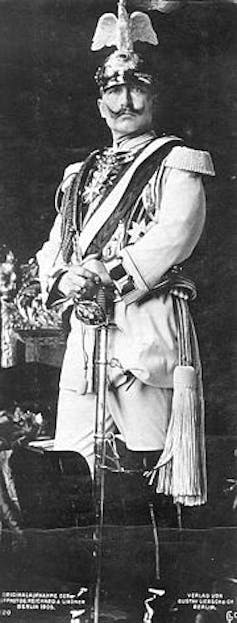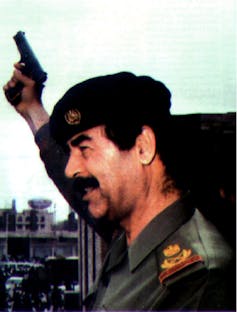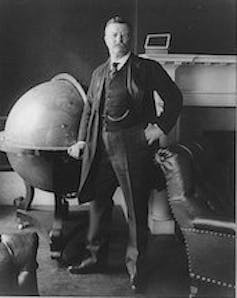Trump isn't the first leader to rattle the world order
- Written by Kelly McFarland, Director of programs and research, Institute for the Study of Diplomacy, Georgetown University
Donald Trump’s recent trip to the G-7 summit smashed expectations of how world leaders should behave[1].
Trump’s actions in Canada included exacerbating the growing trade war and accusing Canadian Prime Minister Justin Trudeau of lying. Summit participants described the President as “angry, mocking, wandering and rude[2].” Trump left the G-7 to meet in Singapore with North Korean leader Kim Jong-un. This only added to G-7 members’ apprehension, as many believe the American leader is more apt to befriend dictators than allies[3].
As the President begins the NATO summit, many allies fear[4] that he will unilaterally take actions that will further call into question America’s support for their countries. Trump has already sent “sharply worded”[5] letters to multiple NATO allies ahead of the summit, admonishing them to spend more on defense.
The President’s decision to hold a summit meeting with Russian President Vladimir Putin[6] days after the Brussels meeting only heightens alliance worries.
I’m a diplomatic historian[7] and practitioner of foreign affairs. History shows us that Trump isn’t the first leader to take a brutish approach to international affairs. It is worth looking back at some historical actors who ignored international norms and acted unilaterally and defiantly.
It’s also worth considering the results of their behavior.
Kaiser Wilhelm’s follies
Wilhelm II, German leader from 1888 to 1918, is an interesting and tragic historical figure, who has recently been compared[8] to President Trump. Those references include one article entitled “What Happens When a Bad-Tempered, Distractible Doofus Runs an Empire[9]?” Wilhelm was the grandson of England’s Queen Victoria. But he did enough to sour relations that even his family ties couldn’t stop Germany and England from going to war in 1914[10].
 Kaiswer Wilhelm II.
Public domain[11]
Kaiswer Wilhelm II.
Public domain[11]
Like his country, Wilhelm was both ambitious and insecure. “Deep into the most distant jungles of other parts of the world, everyone should know the voice of the German Kaiser,” he once wrote[12]. “Nothing should occur on this earth without having first heard him.”
Wilhelm hated being questioned. One historian, Margaret MacMillan, describes how he “deliberately shook hands too hard with his strong right hand[13].” MacMillan also wrote that he liked slapping male monarchs on their behinds and his adolescent playfulness appalled his fellow royals.
Wilhelm had numerous indiscretions and poor policy decisions prior to World War I. His infamous “Kruger telegram” of 1896[14] infuriated London when he congratulated a group of independent south Africans for repelling a British-backed military raid. His decision to expand the German navy and the publication of an infamous 1908 Daily Telegraph “interview”[15] that was insulting and perplexing to British readers also sparked rifts. MacMillan succinctly states that[16] “Wilhelm’s erratic behavior, his changeable enthusiasms and his propensity to talk too much and without thinking first helped to create an impression of a dangerous Germany.”
Ultimately, that perception helped lead to war.
Saddam’s plans go awry
Before America attacked Iraq in 2003[17] and ousted Iraqi President Saddam Hussein[18], the strongman from Tikrit had already earned the international community’s ire with his August 1990 invasion of Kuwait.
That invasion came after a decade of regional instability with Saddam as a troublesome central player.
From 1980-1988, Saddam, angry at and fearful of Iranian interference in Iraq domestically, fought Iran[19] in a vicious war that also sought territorial gains. Kuwait and Saudi Arabia were afraid that Iran’s revolution would spread. Acting on the principle that “the enemy of my enemy is my friend,” they heavily funded Saddam’s war effort[20].
Iraq was worn down and heavily indebted to Arab benefactors following the war’s end in 1988. For some time after, Saddam switched his focus to Kuwait. He laid claim to some of the country’s vast oil deposits and tried to wrest away ports that provided better sea access for oil tankers and cargo ships.
 Saddam Hussein celebrates George H. W. Bush’s 1992 electoral defeat.
Reuters file photo
Saddam Hussein celebrates George H. W. Bush’s 1992 electoral defeat.
Reuters file photo
Saddam’s claims to these rich areas, which he called Iraq’s “19th province”[21], were accompanied by his demands for Kuwait to forgive billions of dollars of debt owed by Iraq. Saddam then claimed Kuwait was siphoning off oil from a shared oil field. Most egregious for Saddam, who was dependent on higher oil prices to rebuild Iraq, was Kuwait’s decision to produce more oil than OPEC quotas[22] had set, driving prices down.
With no solution in sight, Saddam invaded and occupied Kuwait[23] in August 1990.
The Cold War was just ending and the United States was trying to usher in a “new world order”[24], which, it was hoped, would make possible better cooperation among the great powers. That meant Washington and the international community would not, and could not, let Saddam’s actions stand. Ultimately, a military a coalition led by the United States decimated Iraqi forces[25] and Kuwait was freed. Saddam’s grip on his country and the region would never be as strong.
Like many other leaders who disrupted diplomatic norms, Saddam’s actions ultimately failed.
The Rough Rider lives up to his name
An assassin’s bullet killed President William McKinley[26] and made Theodore Roosevelt president in 1901.
The assassination brought a new kind of presidency to the United States: Not only was Roosevelt the youngest president ever, his boldness and his views of the office introduced what we now know as the “imperial presidency[27].”
Freakishly bright and full of boundless energy, Roosevelt ran roughshod over his contemporaries, some of whom called him an imperialist and militarist,[28] while one described him as “the mere monstrous embodiment of unprecedented and monstrous noise[29].” He proclaimed to live by the motto: “Speak softly and carry a big stick.”
 Theodore Roosevelt.
Public domain
Theodore Roosevelt.
Public domain
This was probably most apparent in Latin America. Seeking a U.S. sphere of influence in the Western Hemisphere, Roosevelt bullied and cajoled[30] both regional and European nations when Washington’s interests were threatened, using threats of military action and diplomatic pressure[31].
Roosevelt’s bullishness was felt in Venezuela[32], where Britain and Germany had mounted a blockade over Venezelua’s unpaid debts to those countries. Roosevelt pushed the Europeans to arbitrate rather than blockade[33], fearing European ambitions for Venezuelan territory. It was felt in Panama[34], where he promoted Panamanian independence from Colombia in order to ensure U.S. control over a canal[35] that would be built across Panama. That canal, in use to this day, would connect the Atlantic and the Pacific, although it is no longer under U.S. control.
His most famous, and likely most lasting, influence came with his 1904 “corollary” to the Monroe Doctrine[36]. President James Monroe’s 1823 proclamation stated America’s aim to be in predominant control of the Western Hemisphere, including Latin America.
Roosevelt went further.
Now, not only would the United States diplomatically oppose European intervention in the region, the U.S. would also directly intervene in Latin American countries if Washington felt it would forestall European intervention.
Roosevelt’s action, in part, led to numerous American regional actions in the following decades, in places such as Haiti, Mexico and the Dominican Republic[37]. These actions, left mostly unchecked by European powers, created a negative Latin American view of the United States as an imperialistic power, lasting in some quarters to this day.
These examples are by no means precise comparisons to today. But they do highlight that history is replete with leaders acting bullishly, with singular confidence in their path and lack of concern for the opinions of others, including allies.
And history is also filled with the mixed results – at best – of those actions.
This article has been updated to correct the title of Canadian Prime Minister Justin Trudeau.
References
- ^ smashed expectations of how world leaders should behave (www.washingtonpost.com)
- ^ “angry, mocking, wandering and rude (www.nytimes.com)
- ^ befriend dictators than allies (www.washingtonpost.com)
- ^ many allies fear (www.washingtonpost.com)
- ^ “sharply worded” (www.nytimes.com)
- ^ summit meeting with Russian President Vladimir Putin (www.nytimes.com)
- ^ diplomatic historian (isd.georgetown.edu)
- ^ compared (foreignpolicy.com)
- ^ “What Happens When a Bad-Tempered, Distractible Doofus Runs an Empire (www.newyorker.com)
- ^ going to war in 1914 (www.nationalarchives.gov.uk)
- ^ Public domain (commons.wikimedia.org)
- ^ he once wrote (www.newstatesman.com)
- ^ with his strong right hand (www.penguinrandomhouse.com)
- ^ “Kruger telegram” of 1896 (www.britannica.com)
- ^ 1908 Daily Telegraph “interview” (wwi.lib.byu.edu)
- ^ MacMillan succinctly states that (www.penguinrandomhouse.com)
- ^ America attacked Iraq in 2003 (www.history.com)
- ^ ousted Iraqi President Saddam Hussein (www.cnn.com)
- ^ fought Iran (en.wikipedia.org)
- ^ heavily funded Saddam’s war effort (history.state.gov)
- ^ Iraq’s “19th province” (books.google.com)
- ^ produce more oil than OPEC quotas (www.nytimes.com)
- ^ Saddam invaded and occupied Kuwait (www.history.com)
- ^ “new world order” (www.penguinrandomhouse.com)
- ^ decimated Iraqi forces (archive.nytimes.com)
- ^ killed President William McKinley (archive.nytimes.com)
- ^ imperial presidency (www.washingtonpost.com)
- ^ an imperialist and militarist, (books.google.com)
- ^ “the mere monstrous embodiment of unprecedented and monstrous noise (global.oup.com)
- ^ Roosevelt bullied and cajoled (global.oup.com)
- ^ action and diplomatic pressure (global.oup.com)
- ^ was felt in Venezuela (www.penguinrandomhouse.com)
- ^ arbitrate rather than blockade (millercenter.org)
- ^ It was felt in Panama (www.penguinrandomhouse.com)
- ^ control over a canal (millercenter.org)
- ^ Monroe Doctrine (history.state.gov)
- ^ in places such as Haiti, Mexico and the Dominican Republic (global.oup.com)
Authors: Kelly McFarland, Director of programs and research, Institute for the Study of Diplomacy, Georgetown University
Read more http://theconversation.com/trump-isnt-the-first-leader-to-rattle-the-world-order-99121

